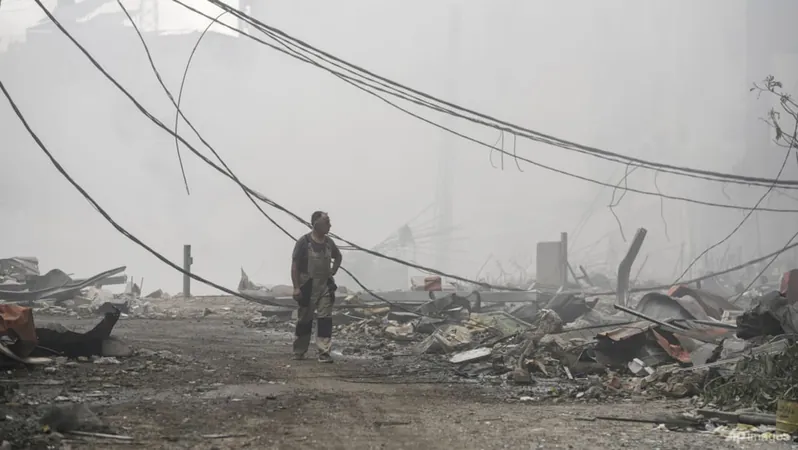
Explosive Escalation: Israel Launches Ground Operations in Lebanon Amid Iranian Warnings
2024-10-08
Author: Daniel
**BEIRUT:** Tensions in the Middle East reached a boiling point as Israel's military confirmed on Tuesday, October 8, that it had initiated ground operations in southwest Lebanon. This aggressive move marks a worrying escalation in military actions that began a year earlier when exchanges of fire with the Iran-backed group Hezbollah intensified.
The unrest was initially sparked by Hamas's surprise assault on southern Israel, which rapidly spiraled into a series of Israeli military engagements, both aerial and terrestrial, in Lebanon. As the conflict expands, Iran has fired a clear warning to Israel, stating any attack on its territory would result in severe retaliation. "Any attack on our infrastructure will be met with force," declared Foreign Minister Abbas Araqchi, just days after Tehran targeted Israeli military facilities with missiles.
Araqchi's diplomatic tour across the Middle East commenced on Tuesday, with stops in Saudi Arabia and other nations. His mission: to rally regional support against Israel's "crimes" in both Gaza and Lebanon. He emphasized the importance of collective action among Middle Eastern countries to protect their sovereignty against Israel's military operations, which, he claims, continue unabated.
As tensions escalate, Israel pressures Hezbollah by executing "localized, targeted operations" in the border areas. Notably, Israeli airstrikes have reportedly resulted in the death of Suhail Hussein Husseini, a senior Hezbollah figure involved in the group's finance and logistics—a significant tactical blow if confirmed. Just weeks prior, Israeli forces conducted an airstrike that reportedly killed Hezbollah's leader, Hassan Nasrallah, shaking the foundation of the organization.
The United Nations has voiced mounting concerns over the humanitarian crisis unfolding in Lebanon. UN representatives stated that their repeated calls for restraint have gone unheeded, leading to a relentless military campaign that has had catastrophic humanitarian impacts on civilians. Over the past year, exchanges of fire have caused widespread devastation, with civilian casualties climbing sharply in recent weeks.
The Broader Implications of the Conflict
With rising apprehension about the potential for a broader conflict, both the United States and Iran are on high alert, carefully calculating their next moves. Reports suggest that Israel may consider targeting Iranian oil facilities in retaliation to Tehran's missile attack, a prospect that could escalate tensions significantly and disrupt global oil supplies.
U.S. President Joe Biden acknowledged the delicate situation, stating he would weigh alternative strategies if he were in Israel's position. The fear of escalating violence looms large, with Israel intensifying its airstrikes, leading to the displacement of 1.2 million individuals in Lebanon alone.
As the bombs rain down, the health ministry in Lebanon reports mounting casualties, with estimates of around 2,000 Lebanese lives lost since Hezbollah's retaliatory aggression began a year ago, echoing the tragic toll seen in Gaza where the situation remains dire.
In a direct response to Israel's military activities, Hezbollah announced missile attacks against military bases in Israel, with a striking range that has now penetrated deep into Israeli territories. Reports indicate that around 190 projectiles were fired into Israel on Monday, resulting in multiple injuries and increasing fears that the region is on the brink of a larger-scale war.
With each passing day, the conflict showcases the dire humanitarian crisis in Lebanon while the specter of an all-out regional war looms ever closer. In this charged atmosphere, both sides appear locked into a cycle of retaliation that could unravel the already fragile stability of the Middle East, leaving the future uncertain and fraught with peril.


 Brasil (PT)
Brasil (PT)
 Canada (EN)
Canada (EN)
 Chile (ES)
Chile (ES)
 España (ES)
España (ES)
 France (FR)
France (FR)
 Hong Kong (EN)
Hong Kong (EN)
 Italia (IT)
Italia (IT)
 日本 (JA)
日本 (JA)
 Magyarország (HU)
Magyarország (HU)
 Norge (NO)
Norge (NO)
 Polska (PL)
Polska (PL)
 Schweiz (DE)
Schweiz (DE)
 Singapore (EN)
Singapore (EN)
 Sverige (SV)
Sverige (SV)
 Suomi (FI)
Suomi (FI)
 Türkiye (TR)
Türkiye (TR)